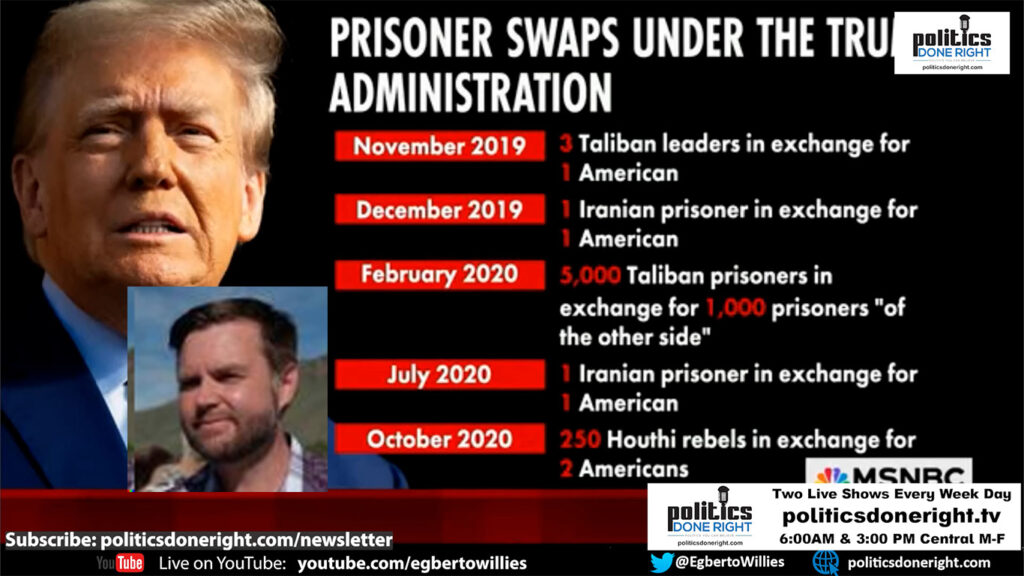A weird-sounding JD Vance implies that Donald Trump is responsible for Vladimir Putin releasing the wrongly detained citizens because they believed Trump was going to win. REALLY!
JD Vance has a weird inference about prisoner swap.
Podcasts (Video — Audio)
In the perplexing and often contradictory world of contemporary American politics, few statements capture the absurdity and twisted logic more poignantly than those offered by JD Vance, Ohio’s Republican Senator, regarding the recent prisoner swap between the United States and Russia. Vance’s assertion that President Biden and Vice President Kamala Harris‘s successful negotiation for the release of prisoners was somehow catalyzed by the impending return of Donald Trump to office is a masterclass in cognitive dissonance.
During a recent broadcast, Vance insinuated that bad actors globally are rushing to make deals before Trump possibly reclaims the White House. This notion stretches the boundaries of logic and reality. The implication is that Trump’s anticipated return instills fear in international leaders, prompting them to act now before Trump’s supposedly iron-fisted approach makes such negotiations impossible.
This line of reasoning not only credits Trump for actions he had no part in but also fundamentally misunderstands the diplomatic process and the situation’s specifics. During his tenure, Trump made grand claims about his unique ability to secure the release of hostages, often boasting that only he could achieve such feats due to his rapport with leaders like Vladimir Putin. However, Trump’s record contradicts these boasts. Under his administration, Paul Whelan was arrested and remained detained by Russia despite Trump’s promises and purported personal connections.
Trump’s rhetoric, often untethered from factual accuracy, further muddles the narrative. In his social media posts, Trump derided the recent prisoner swap, suggesting that his administration never made such deals and achieved releases without any exchanges. However, historical records tell a different story. For instance, in 2020, Trump’s administration agreed to release 5,000 Taliban prisoners in exchange for 1,000 detainees, and later that year, 250 Houthi rebels were freed in exchange for two Americans.
The contrast between Trump’s grandstanding and the actual diplomatic work done by the Biden administration highlights a significant divergence in approach and efficacy. Biden’s administration, despite facing criticism and complex diplomatic challenges, has successfully negotiated the release of detained Americans, including Paul Whelan and Evan Gershkovich. These negotiations often require nuanced diplomacy and concessions, underscoring the multifaceted nature of international relations, something Trump’s binary and often blusterous approach failed to appreciate or address.
The media plays a crucial role in shaping public perception of these events. In its quest for balance, mainstream media often presents both sides of the political spectrum as equally valid, even when one side’s assertions are demonstrably false or misleading. This false equivalence grants undue legitimacy to baseless claims and conspiracy theories. Consequently, independent media must correct these narratives, providing context and factual clarity.
Trump’s recent statements criticizing the prisoner swap as a “bad deal” reflect his continuous strategy of undermining the current administration while falsely elevating his record. His inability to express any joy or relief at the return of American citizens, instead opting to politicize the event, reveals a concerning disregard for the human element at the heart of these negotiations.
The political landscape benefits little from such divisive and misleading rhetoric. Instead, it requires a commitment to truth, respect for diplomatic processes, and a focus on citizens’ well-being. Trump’s legacy, marked by self-aggrandizement and a disdain for nuanced diplomacy, stands in stark contrast to the tangible results achieved by the Biden administration in prisoner negotiations.
Independent media’s role in deconstructing these narratives is vital. Independent media ensures a more informed public by breaking down complex issues into understandable parts and challenging the false narratives often propagated by mainstream outlets. This is crucial when misinformation spreads rapidly and political figures like Trump manipulate facts to serve their agendas.
JD Vance’s comments attributing the success of the Biden administration’s prisoner swap to Trump’s potential return are not just misleading but also reflective of a broader issue within American political discourse. This narrative distorts the truth and undermines the hard work of those who negotiate these sensitive and critical deals. It is imperative that media, both mainstream and independent, strive to present the reality of these situations, eschewing false equivalence in favor of factual accuracy and context.

